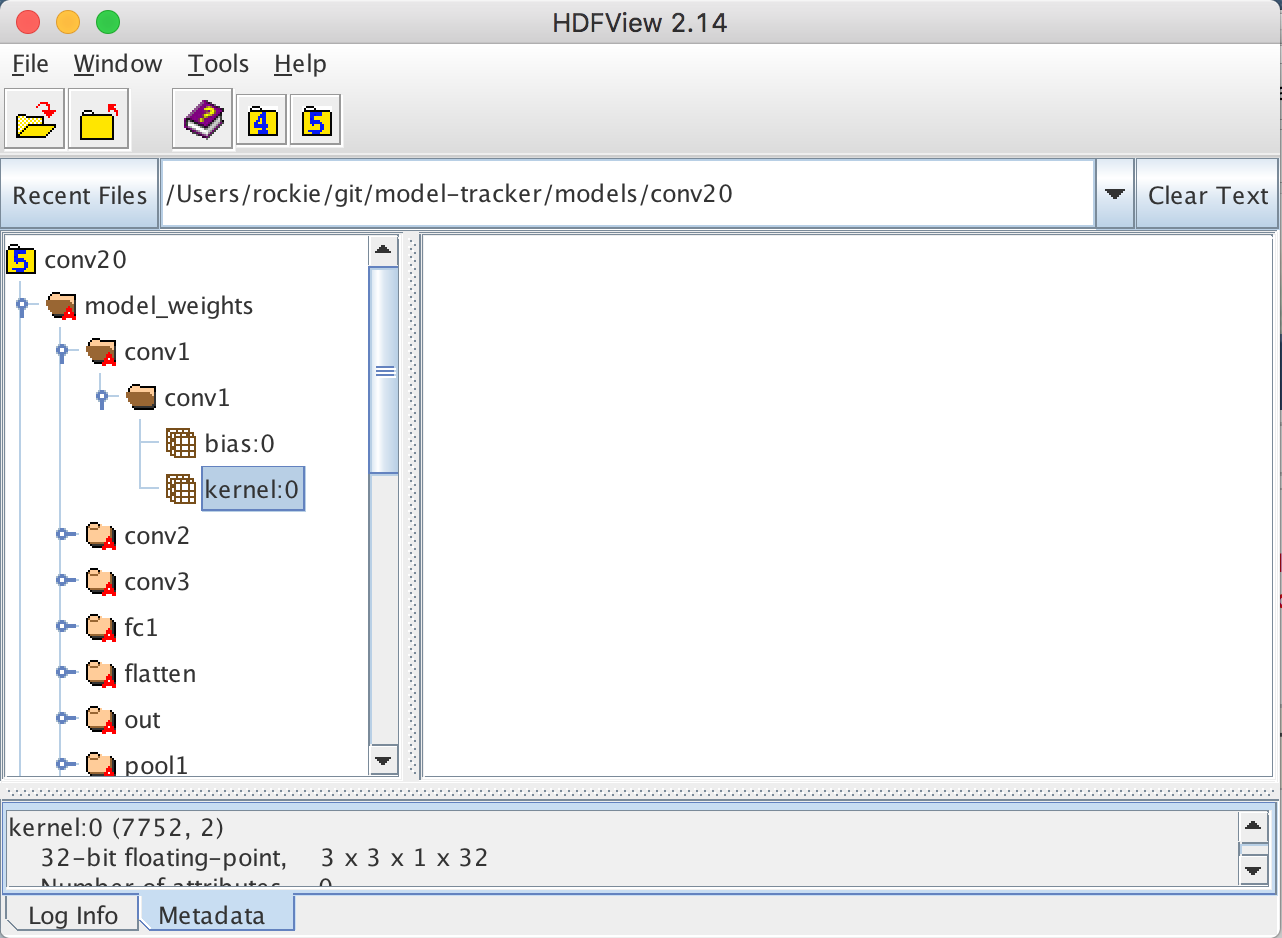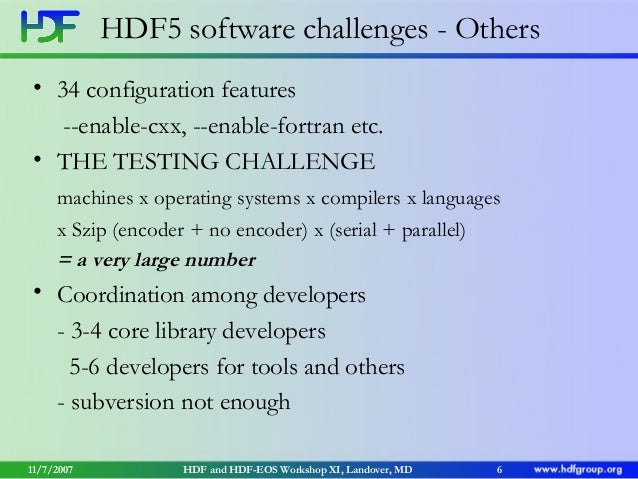Download Hdf Viewer Mac Software. HDFView for Mac OS X v.2.8The HDFView is a Java-based tool for browsing and editing NCSA HDF4 and HDF5 files. HDFView allows users to browse through any HDF4 and HDF5 file; starting with a tree view of all top-level objects in an HDFfile's hierarchy.
Status
- I needed a 64-bit version of HDF5 and NetCDF4, here’s how you get that going on Mac OS X 10.6. Download the and uncompress the static HDF5 1.8.6 binaries. Download the and uncompress the NetCDF 4.1.2 source. Get rid of all of the.la files in the HDF5 libs folder. From the command line, set the following environmental variables.
- hdf-forum hdf5 application on Mac OS X On Tue, Dec 09, 2008 at 12:19:57PM -0500, Manav Bhatia wrote: Thanks. When running on multiple processors, there is a vector that I write to the hdf file from the 0th processor.
Currently testing with nodejs v9.9.0 and V8 6.2.414.46-node.22.
If your native hdf5 libraries aren’t at the default you can set the path with –hdf5_home_linux switch on this project as well as dependent projects.
If you want static native linking set –link_type to static
For mac and windows the switches are –hdf5_home_mac & –hdf5_home_win
Dependencies
- HDF5 C Library v5-1.10.0-patch1 (Prior v5-1.8.x’s untested yet should work)
native install on Ubuntu
If you don’t already have and don’t know where your native hdf5 install is located:
The installed location could be /usr/lib/x86_64-linux-gnu/hdf5/serial


Compiling
The code requires a gcc compiler supporting C++11 for linux, MacOSX & Windows. The binding.gyp defines the cflags with -std=c++11.
In a working copy of git
NODE_PATH is still used for the mocha tests.
Environment Variables
The path to the HDF5 shared objects must be added to the runtime library search path.
for linux example:
for Mac OSX example:
for Windows example:
If you want one of the third party filters available put its install path on HDF5_PLUGIN_PATH
Running Test
The tests are based on co-mocha
Introduction
This guide is intended to help Intel® compiler customers build and use the HDF5 library. HDF5 is the latest generation of the HDF libraries, a general purpose library and associated file formats for storing and sharing scientific data. HDF5 is maintained, promoted, and co-developed along with active community support by The HDF Group (THG). THG is a not-for-profit corporation with the mission to sustain HDF technologies and to provide support to HDF user communities. The homepage for THG and HDF5 can be found at http://www.hdfgroup.org/HDF5/.
Version information
HDF5 1.8.8 and later.
Intel® C++ Compiler for Linux* or Mac OS* X
Intel® Fortran Compilers for Linux* or Mac OS* X
Application Notes
Hdf5 For Mac Os
HDF5 is a data format and an associated software library designed to store, access, manage, exchange, and archive diverse, complex data in continuously evolving heterogeneous computing and storage environments. HDF5 is extensively used with scientific research, engineering development, and other data.
This application note demonstrates the framework for building HDF5 with the Intel compilers but does NOT claim to represent all possible configurations and variations of the build for all possible target environments.
Obtaining the Source Code
Hdf5 For Mac Shortcut
The HDF5 source files should be obtained from the HDF5 Software downloads page at http://www.hdfgroup.org/HDF5/release/obtain5.html. Please note the External Library requirements for SZIP and ZLIB and download those if you do not already have those libraries.
Obtaining the latest version of Intel C++ Compiler and Intel Fortran Compiler
Licensed users of the Intel compilers may download the most recent versions of the compiler from the Intel® Download Center: Intel® Registration Center. Other users can download the evaluation copy from https://software.intel.com/en-us/articles/try-buy-tools.
Prerequisites

Software: As mentioned on the HDF5 software downloads page, either SZIP-2.1 or ZLIB libraries can be used for file compression/decompression. Precompiled binaries or sources are available from the HDF5 Software Downloads page for these two libraries.
SZIP: Determine an appropriate location to install SZIP. Directory /usr/local/szip-2.1 may be a reasonable choice. If you wish to build and install szip from the source files, use the procedure shown below:
The above example uses the BASH shell syntax for setting environment variables. For other shells, use the appropriate commands to set environment variables CC, CXX, etc. before the make command. Confirm that after the 'make check' command, the result of the tests return the result 'All test passed.'
Check the directory specified by your --prefix= setting. This directory should contain lib/ and include/directories. For more information on building szip, consult the file named INSTALL in the source directory.
ZLIB:The information shown is for zlib version 1.2.7. zlib is a general purpose data compression library and is a prerequisite for building HDF5. Determine an appropriate location to install zlib. /usr/local/zlib-1.2.7 may be a reasonable choice. If you wish to build and install zlib from the source files, use the procedure shown below:
The above example uses the BASH shell syntax for setting environment variables. For other shells, use the appropriate commands to set environment variables CC, CXX, etc. before the make command. Confirm that after the 'make check' command, the result of the tests return the result 'test OK'.
Check the directory specified by your --prefix= setting. This directory should contain lib/, include/, and share/directories. For more information on building zlib, consult the file named 'README' in the source directory.
Configuration andSetup Information for HDF5
HDF5 uses an Autoconf 'configure' script to determine the build environment and tools and create the necessary build configuration. The first step is to set environment variables to control which compilers are used for the build. These environment variables select the Intel C++ Compiler and the Intel Fortran Compiler.
As shown above, the environment CC, CXX and F9X are used to specify which compilers are used to build HDF5. The example shown above uses both the Intel C++ Compiler ( CC=icc CXX=icpc ) and the Intel Fortran Compiler ( F9X=ifort ). Note that the Intel C++ compiler driver is named 'icpc'. Do NOT use 'icc' as the C++ compiler. The Intel compilers are GNU compatible, thus you may mix and match the Intel compilers with GNU compilers for C++ and Fortran. However, the mixing of GNU compilers with Intel compilers has not been tested with this application.
There are environment variables such as CFLAGS to pass compiler options to the C compiler. However, the configuration script will automatically detect the Intel compilers and use the appropriate optimization options. Thus, the user need not specify optimization settings unless one wants to override the default settings set by configure.
To Extract the Source files and to Configure and Build HDF5
The configure script has many options. Refer to the help provided in the output of './configure --help' or read the contents of the file README.
Using HDF5

There is user documentation in the doc/html subdirectory of the source file directory. Look for the file 'index.html' and view this file in a browser. This doc/html directory can be copied over to the installation directory.
In general, user program include <hdf5.h> and link with -lhdf5. Additional libraries may be necessary. Please see the user documentation for all the details on the use of HDF5. Users are encouraged to use the compiler helper scripts h5cc, h5fc and h5c++ to build their applications. These helper scripts are installed in the bin/ subdirectory of the installation directory.
Known Issues and Limitations
- See the HDF5 website for a list of known issues and limitations